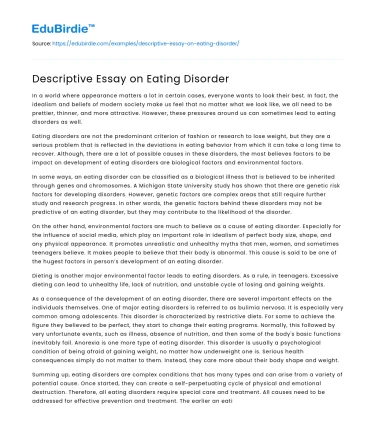In a world where appearance matters a lot in certain cases, everyone wants to look their best. In fact, the idealism and beliefs of modern society make us feel that no matter what we look like, we all need to be prettier, thinner, and more attractive. However, these pressures around us can sometimes lead to eating disorders as well.
Eating disorders are not the predominant criterion of fashion or research to lose weight, but they are a serious problem that is reflected in the deviations in eating behavior from which it can take a long time to recover. Although, there are a lot of possible causes in these disorders, the most believes factors to be impact on development of eating disorders are biological factors and environmental factors.
Save your time!
We can take care of your essay
- Proper editing and formatting
- Free revision, title page, and bibliography
- Flexible prices and money-back guarantee
In some ways, an eating disorder can be classified as a biological illness that is believed to be inherited through genes and chromosomes. A Michigan State University study has shown that there are genetic risk factors for developing disorders. However, genetic factors are complex areas that still require further study and research progress. In other words, the genetic factors behind these disorders may not be predictive of an eating disorder, but they may contribute to the likelihood of the disorder.
On the other hand, environmental factors are much to believe as a cause of eating disorder. Especially for the influence of social media, which play an important role in idealism of perfect body size, shape, and any physical appearance. It promotes unrealistic and unhealthy myths that men, women, and sometimes teenagers believe. It makes people to believe that their body is abnormal. This cause is said to be one of the hugest factors in person’s development of an eating disorder.
Dieting is another major environmental factor leads to eating disorders. As a rule, in teenagers. Excessive dieting can lead to unhealthy life, lack of nutrition, and unstable cycle of losing and gaining weights.
As a consequence of the development of an eating disorder, there are several important effects on the individuals themselves. One of major eating disorders is referred to as bulimia nervosa. It is especially very common among adolescents. This disorder is characterized by restrictive diets. For some to achieve the figure they believed to be perfect, they start to change their eating programs. Normally, this followed by very unfortunate events, such as illness, absence of nutrition, and then some of the body's basic functions inevitably fail. Anorexia is one more type of eating disorder. This disorder is usually a psychological condition of being afraid of gaining weight, no matter how underweight one is. Serious health consequences simply do not matter to them. Instead, they care more about their body shape and weight.
Summing up, eating disorders are complex conditions that has many types and can arise from a variety of potential cause. Once started, they can create a self-perpetuating cycle of physical and emotional destruction. Therefore, all eating disorders require special care and treatment. All causes need to be addressed for effective prevention and treatment. The earlier an eating disorder is discovered, the better the chance for recovery.






 Stuck on your essay?
Stuck on your essay?

